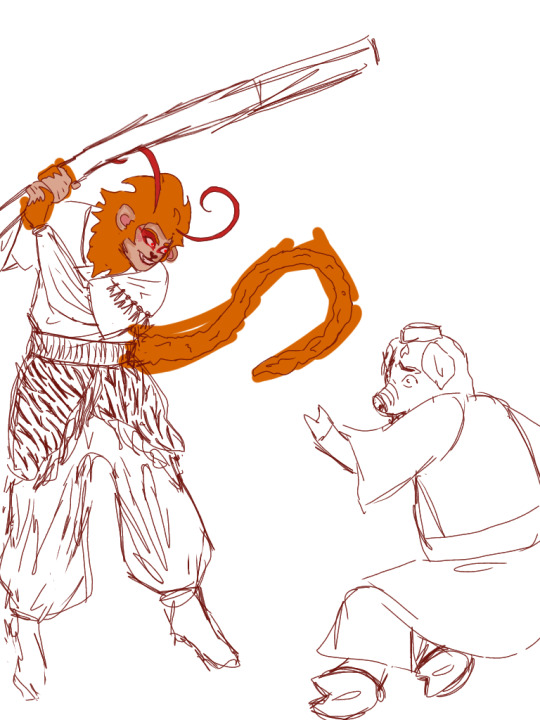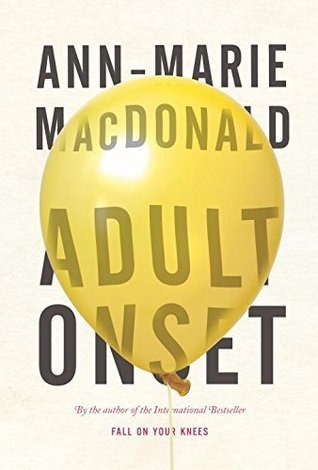#I have the ugly line art (I refuse to make it tidy) and a little colour
Explore tagged Tumblr posts
Text
Progress report

Based on this

#Journey to the West#Jttw#sun wukong#monkey king#Zhu Bajie#I just got tortured by a choreographer#I'm disabled but I can still walk with my cane so she seems to think that means I can dance too#Btw this is for a musical. I did not go to a dance class#I don't have to do tap tho so it's ok#Mainly just weird arm (singular) waving#I have the ugly line art (I refuse to make it tidy) and a little colour#You can't tell me off for going outside the lines cause I'm gonna fix it#Pigsy gave me trouble ngl#A pig man is not a hard concept to visualise but with that expression my brain was breaking#It was rough for those first 5 minutes#Idk what to post today so this is that
17 notes
·
View notes
Text
Adult Onset, Ann-Marie MacDonald

Rating: Great Read Genre: Realism, Literary Representation: -Lesbian protagonist -Lebanese protagonist -Protagonist with anxiety/panic disorder Trigger warnings: Infant death, Stillbirth (explicit), Child abuse, Child sexual abuse (not in scene), Homophobia, Misogyny, Biphobia, Animal death, Internalized racism, Reclaimed D-slur
Note: Not YA; somewhat sexual but not explicit
Transitioning into reading more adult fiction than YA in your early twenties is often unpleasant. Disturbing topics make a happy home in adult fiction, and they don’t always announce themselves in the book jacket. (Adult Onset’s book jacket even describes the novel as “hilarious” - a fact which is hilarious in itself. Are adults okay?) The disturbing topics aren’t bad in and of themselves. Adult readers of these difficult literary novels can sometimes resonate with the battle between ugliness and meaning, finding catharsis in the trenches. Some readers may even find an unpolished aspect of themselves reflected in the novel, their relationship to the book becoming a form of literary therapy. The books that save lives are rarely the easiest reads. By the same token, undertaking a difficult literary novel can put a bitter taste in your mouth. Sometimes that moment of catharsis isn’t worth the taste.
I found myself waffling over my opinion about Adult Onset. On the one hand, it’s about the generational gift of abuse from mother to daughter, and the ugliness of that abuse is not safely contained within a “bad guy” the reader can despise, but in sympathetic characters. It’s an uncomfortable book with a subject matter that isn’t going to appeal to the escapist reader, that’s for sure. On the other hand, as we get older, many of us develop more tolerance for morally gray characters as we discover that we are morally gray ourselves; it can even be refreshing to read about someone with our same flaws - flaws bad enough we might hesitate to speak about them - treated not as evil, but human. Reading Adult Onset, I felt myself straddling that line. Yes, Adult Onset was an uncomfortable, unhappy read. But at the same time, I saw glimpses of myself in the main character’s serious anger and anxiety. While I’m not a mother in my mid-forties struggling to manage a suburban household, anyone who has had to grapple with mental illness or abuse will feel kinship to Mary Rose.
Adult Onset is one of those books that can’t be measured by plot. The narrative is urged forward by the compulsion of symmetry, not linear time, and so the story takes a beautiful, mirrored shape, rather than the parabola of a plot arc. The central character, who is the line across which the shape of the story is reflected, is Mary Rose (“Mister” for short), a lesbian mother of two who used to write YA novels, but who has since traded roles with her wife in favor of home-making, giving her wife a chance to follow her career as a theater director. Mary Rose has untreated anxiety that causes her to catastrophize everything in her life. She has untreated anger that causes her to yell and throw things in front of her kids. She is kind of a dick, to use the most accurate term, which causes her to ask her wife, “If she got the flowers?” when Mary Rose never sent any flowers (but feels like she might be in trouble if she doesn’t make some claim at a redeeming quality). Mary Rose is also the heir to two generations of abuse. Her maternal grandfather married a twelve year old child. Her mother hit her and her brother (her elder sister had a different experience). Both parents rejected her in the most severe way when she came out as a lesbian in her twenties. She has chronic pain from childhood bone cysts, a pain which leads her down the rabbit hole of memory as she tries to find some closure on a childhood that her aging parents don’t fully remember anymore.
Adult Onset is a good book. It’s a beautiful piece of art. The structure of the novel is inspired, leaving one more than satisfied with the symmetrical beauty of it all. The narrative about Mary Rose is inter-cut with glimpses from Mary Rose’s mother’s perspective, showing the reader not an old woman with memory loss, but the young mother struggling with postpartum depression she once was. We also receive the perspective of the main character from Mary Rose’s popular YA book series, a young girl whose magical adventures were unwittingly inspired by Mary Rose’s trauma. These snapshots of other points of view are unannounced, and even confusing at first - but therein lies their value. Mary Rose’s identity bleeds into her mother and her main character, and the structure of the novel itself illustrates that.
Adult Onset is a good book. It takes Mary Rose’s flaws, holds them before the reader, and says: motherhood is not easy, and you’re not a bad person for floundering. It explores where the line is, that makes a person irredeemable. Mary Rose almost hits her toddler, and she thinks with horror - what if there is an alternate universe where she really did? She thinks about her own life in those terms, considering that while she is the Mary Rose who was abused by her parents, perhaps there is an alternate Mary Rose who wasn’t. She loves and defends her parents as if they didn’t pass her trauma down to her, as if she were the lucky Mary Rose - yet she still contends with the unhappy result. She asks herself: if her parents don’t even remember her childhood anymore, are they still the parents who did and said the things that hurt her?
Adult Onset is a good book, but it is also a book that very artfully dances around a concerning issue with its theme. Herein lies the problem: Adult Onset gives itself an almost impossible task, that of fixing Mary Rose’s unhappy life into a somewhat happy ending. Mary Rose almost hit her toddler, her marriage is on the rocks because she keeps yelling at her wife, and she refuses therapy to the bitter end. The reader won’t be satisfied with the realism of the book if Mary Rose changes too much for the better, nor will the reader be satisfied with an unhappy ending. In the end, Mary Rose doesn’t really change, so much as realize she can ask for help. She asks a friend to come over and stay with her for a couple of days while her wife is out of town, and she has an all-day play-date with a mom from her son’s preschool - a mom who Mary Rose has always believed is perfect, but who whispers to Mary Rose, “You saved my life today.” Mary Rose could have said the same thing, a fun little turn of the tables with the positive message that there is no perfect mother. Women suffer far too much unaddressed misery, desperation, and shame (with dire consequences), but there is solace and reprieve in one another’s support. This one play-date, and the lesson therein, is the cathartic moment of the novel.
Yet one play-date carries a heavy burden, if it is to be the cathartic moment of a novel about abuse, infant mortality, anger, anxiety, lesbianism, and motherhood. On reflection, a reader might be more horrified than satisfied, that a play-date is the only help Mary Rose is to receive. Perhaps MacDonald would agree, because after this play-date from heaven, Mary Rose’s life magically falls into place in all sorts of ways. She’s the mom who has it together now, offering organic pretzels to the lesser mothers who forgot to pack a snack for the park. She even makes peace with a memory of her father’s homophobia, satisfied by how far he’s come in the twenty years since. Her wife, who hasn’t wanted sex over the course of the novel, suddenly changes her mind when she finds some lingerie that Mary Rose bought for herself (even though she didn’t even really want it). Mary Rose’s experience of gender is what some readers might call dysphoric, but Mary Rose herself calls “internalized misogyny.” She feels like it’s wrong of her to be uncomfortable with womanhood, so when her wife tells Mary Rose to wear the lingerie to bed, reminding her with exasperation that “I’m attracted to women,” Mary Rose falls in line. What a tidy ending! Motherhood? Resolved. Relationship with parents? Resolved. Sex life? Resolved. Complicated lifelong relationship to gender? Resolved.
This was the real key to my discomfort with the ending of the novel. The message seems to be: if you’re about to self-destruct (taking your children down with you)... just get with the program. At your breaking point? Just ask your friend to come over with spaghetti. Just set up a play-date. Just perform motherhood better. Just perform womanhood better. How sad is it, that this was all the book could give Mary Rose? If the theme of your novel is also the Nike slogan, it’s not as radical an outlook on life as one might think.
The weak ending aside, there are only a few such cracks in the perfect veneer of Adult Onset. The Gen X humor is off-putting (What’s up with Facebook, ladies, am I right?), and Mary Rose obnoxiously discredits her wife’s bisexuality, saying “She refuses to call herself a lesbian.” She still uses the word “transgendered,” too, which even word processors auto-correct these days. And yet, for all its flaws, Adult Onset is a good book. If you have anger and have ever been a hair's breadth away from hitting a child in your care - and let’s face it, this is the unspoken shame for many, many mothers - it’s a book that will make you feel seen, and understood. The mothers that have hit their children in a moment - or months, or years - of weakness are seen too, in Mary Rose’s mother, who is neither torn down nor excused, but simply put to the page.
Adult Onset is a good book, yes, but do I recommend it? Not to everyone. It’s a frustrating book. It covers topics that may be triggering. It’s a book that can, and probably will, ruin your day (Gen X humor just isn’t enough to cut the despair, folks). On the other hand, it offers an underlying message that not every book can give you: Even if you didn’t solve the problem, even if you’re just barely hanging on by a toxic “Just do it!” attitude, there is grace for you.
For more from Ann-Marie MacDonald, visit her website here.
#adult onset#ann-marie macdonald#great read#lesbian#protagonist of color#literary#realism#reviews only#not ya#mentally ill protagonist
2 notes
·
View notes